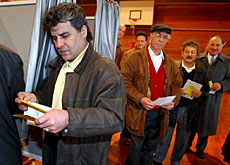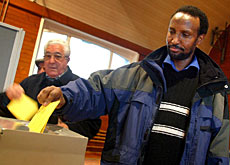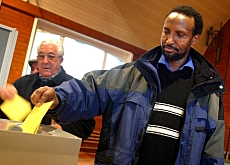Canton Bern denies foreigners voting rights

The canton of Bern, Switzerland's second largest in terms of residents, has narrowly decided against letting foreigners vote at local level.
Political rights for foreigners – who make up 20 per cent of the Swiss population – vary from canton to canton, with the majority according no voting rights to non-Swiss inhabitants.
The motion, which was debated in Bern’s cantonal parliament on Tuesday, wanted to leave it up to each commune in the canton to decide whether to give foreign residents voting rights.
But parliamentarians rejected the move, with opponents – mostly those on the right of the political spectrum – arguing that foreigners should first integrate, get Swiss citizenship and then receive the right to vote.
Those in favour had argued that it would encourage integration and communal autonomy.
Under the Swiss federal system, issues are normally decided at the lowest level, meaning that communes have the power to vote on what affects them the most, such as schools and roads.
Andreas Ladner, a politics expert at Lausanne’s Graduate Institute of Public Administration, said he was not surprised by the result, especially as the issue of foreigners voting was far more controversial in the majority German-speaking part of the country.
Currently only nine of the 26 cantons accord foreigners certain civic rights, with the French-speaking cantons leading the way.
Differences
Ladner says this can be explained by the different political culture.
“In the German-speaking part, self-determination in the communes and direct democratic participation is considered more important, whereas in the French-speaking part the communes have a largely representative policy,” Ladner told swissinfo.
This meant the hurdles for foreigners to clear were smaller in the French part.
“The other reason is that the French-speaking part is apparently more integration-friendly than the German-speaking part,” added Ladner.
Canton Neuchâtel, in French-speaking Switzerland, is the most progressive in according voting rights. Foreigners have enjoyed the right to vote at local level since 1850 and received voting rights at cantonal level in 2000.
Since 1978 non-Swiss residents of Jura have been able to vote and stand for election at local and vote at cantonal level.
In Geneva, foreign residents of the cantons have had voting rights at local council level since 2005 but cannot stand for office.
The first Swiss-German commune to accord the vote in local elections to foreigners was Wald in Appenzell Outer Rhodes, which did so in December 1999.
Some cantons, including Graubünden, Basel City and Vaud, have left it up to their communes to decide whether to accord political rights to foreigners.
swissinfo with agencies

More
Commune
Foreigners can do the following in:
Neuchâtel: vote in communal and cantonal elections and vote for senators.
Jura: vote in communal and cantonal elections and be elected in the former.
Geneva: vote at local council level but not stand for office.
Vaud: vote in communal elections.
Appenzell Outer Rhodes, Basel City, Solothurn and Graubünden: vote in communal elections if communes in favour.
Fribourg: stand in communal elections but not vote.
There have long been calls to allow foreigners to vote, particularly from the political left.
Neuchâtel was the first canton to give this right at a communal level in 1850. It was for a long time an exception.
When it was created in 1978, the canton of Jura pioneered the vote in communal and cantonal elections and the right to be elected in the former.
Since 2000, the voting rights for foreigners has gained ground at the cantonal level. But there are no rights at federal level.
Communal voting rights: Neuchâtel, Jura, Appenzell Outer Rhodes (3 out of 20 communes), Vaud, Graubünden (no communes use it), Fribourg and Geneva.
Cantonal voting rights: Jura, Neuchâtel, Fribourg.
Right to stand at communal level: Neuchâtel, Jura, Vaud, Fribourg

In compliance with the JTI standards
More: SWI swissinfo.ch certified by the Journalism Trust Initiative


You can find an overview of ongoing debates with our journalists here. Please join us!
If you want to start a conversation about a topic raised in this article or want to report factual errors, email us at english@swissinfo.ch.